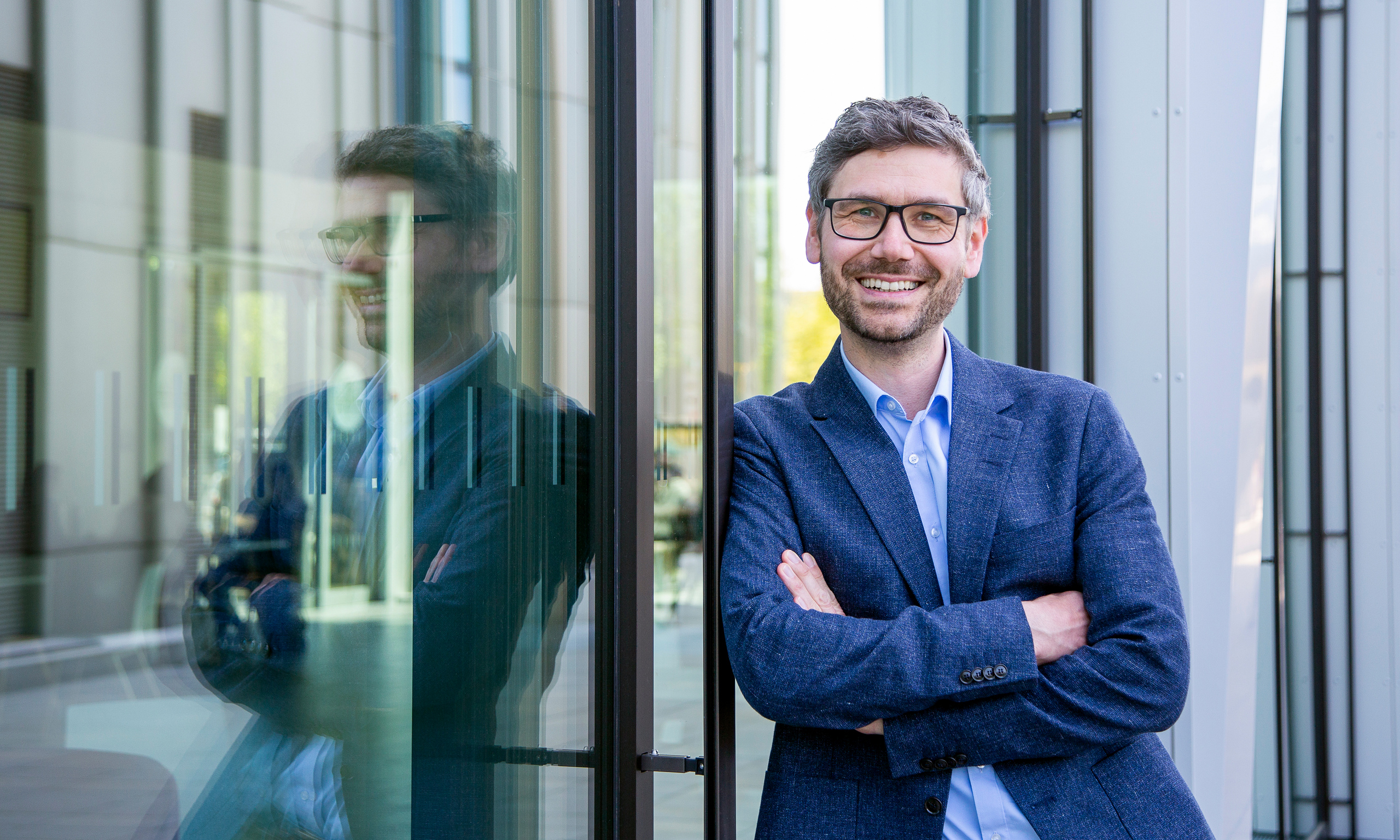Suggestions for a fair financial system

Professor Christoph Becker, financial mathematician at Darmstadt University of Applied Sciences, is campaigning for a fair financial market. In this interview, he talks about the enormous power of funds, ads from his local bank – and how he would like to invest.
Interview: Kilian Kirchgeßner, 24.6.2024
impact: Professor Becker, when you go to the bank, how far is it to your nearest branch?
Professor Christoph Becker: It’s not that far, but there is no one there anymore, just an ATM. I always feel slightly melancholy when I go in there and remember that there used to be people sitting there who spoke to you and knew the local circumstances inside out because they walked down the same street every day.
impact: That sounds very much like you’re glorifying the past.
Becker: No, it’s something else. I’m convinced that regional financial structures are very important. For a bank with roots in the region, the well-being or otherwise of that region and the customers living there is the immediate basis of its business. It grants loans to nearby companies and in this way supports its own region’s development. If, by contrast, a large global fund grants loans, this is merely one of its many investment opportunities. The region’s well-being is reduced to a problem of risk management. In my opinion, that’s not enough.
impact: Just a second, are you saying that global funds compete with local banks?
Becker: There is a gradual shift behind this – away from a financial system based on banks and towards a system based on the capital market. Let’s look at how things were in the past: anyone who wanted to invest money did so at their local bank, which in turn used the capital to grant loans to local companies and home buyers. These were negotiations at eye level.
impact: And today?
Becker: Today, people pay money into various funds: pension and investment funds, for example. Behind these are very complex structures in which the money flows through quite a few countries via corporate networks – and where it ends up is unclear. In turn, these funds also have to invest the money, but they are sitting on such unimaginable sums that a single borrower for an apartment in Darmstadt or a local SME is hardly of any consequence. But we shouldn’t blame the global funds for this: such individual instances all too easily overstretch global structures as such, which simply cannot afford to deal with them. If we want to find fault with anyone at all, then only with ourselves. It is we who create or support structures that at the end of the day rebound on us, regardless of the good intentions of everyone involved.
impact: But a private individual cannot apply for a loan from an international fund anyway.
Becker: That’s correct. The usual procedure is as follows: banks grant small to medium-sized loans, for example, and then collect them in a big parcel until the total credit volume is worthwhile for large institutional investors. And these huge parcels, in which the securitised loans are aggregated, are then sold to investors in a bundle. This means it’s no longer a matter of an individual company but a bundled analysis of risk and return.
About Christoph Becker
Christoph Becker is Professor of Financial Mathematics and Stochastics at Darmstadt University of Applied Sciences. His research interests are risk management and stability of the banking and shadow banking system, the further development of the financial system to finance the energy transition, as well as financial market econometrics and data science. Christoph Becker worked as a risk manager at Commerzbank AG in Frankfurt. He studied Applied Mathematics at Trier University and earned his doctoral degree in financial mathematics at Frankfurt School of Finance & Management. Becker is a member of the association “Finanzwende” (Finance Watch Deutschland), which campaigns for sustainable financial markets. Photo: h_da / Samira Schulz
impact: What are the consequences of that?
Becker: Firstly, power is becoming immensely concentrated. In former times, there were many decentralised banks, and it was they who decided about granting loans. Today, the number of funds around the world that make loan decisions is continuously decreasing. But there is something else. A financial system that is genuinely at the service of society tries systematically to create win-win situations. A small, regional bank might think like this: After the last floods, my customers’ homes need renovating and for that they need a loan. To ensure that my customers are still well-off financially tomorrow and do business with me, granting particularly favourable, earmarked loans for the repair work is worth my while. Everyone benefits. That is what some small, local banks in Germany did recently. As far as I know, global funds don’t do that. And that’s only logical: win-win situations can be created at local or regional level. Viewed from a global perspective, it’s much more difficult.
impact: Is the concentration of power you mentioned not a natural development? We are also seeing it in retail, for example, where power is concentrated in global corporations and no longer distributed among the many retailers in the pedestrian zone.
Becker: That is quite clearly the same kind of concentration of power. In retail, however, the problem is much more visible because everyone witnesses it in everyday life when yet another small shop is obliged to close down. In the financial system, it’s more abstract, which makes it more difficult to spot in everyday life. That’s why I want to draw attention to this.
impact: Every consumer can decide, for example, whether they want to invest in sustainable products.
Becker: Oh yes, I like to call them “buyable ideals”. But seriously, you’re referring to what are known as ESG products, which take the three key sustainability criteria into account, that is, environmental, social and governance factors. Behind this is a system where an investment fund evaluates all the companies in which it invests according to certain criteria. Points are awarded for good behaviour, as it were, and the number of points is linked to whether and under what conditions access to a loan is granted.
impact: Why is it bad when sustainability is a criterion?
Becker: It’s quite simple. There are no standardised benchmarks for this ESG ranking. Some funds even include questions about staff fluctuation or the number of pending cases before an industrial tribunal. What is measured and how is entirely arbitrary. It always reminds me of the Chinese system, where citizens are awarded social credits if they behave as the government wants. Behind this is an acute threat to self-determination and individual freedom. And something else is conspicuous...
impact: …namely?
Becker: Why should the financial system, of all things, be particularly capable of evaluating or enforcing sustainability? Take a particularly extreme example from among players active in the financial system: hedge funds. Typically, hedge funds are registered in a tax haven. There is no clearer way of showing that you don’t care about the rules of the game in a civilised society.
impact: Does this mean, conversely, that we should do away with global financial structures?
Becker: No, we need them, too, of course. In most cases, however, local structures are superior, meaning that we need to shift away from the concentration of power and towards a financial system that fosters individual freedom. The solution is a targeted, carefully metered regionalisation of financial relations.
impact: A return to the bank branches of the 1960s?
Becker: No, it’s not that simple! After all, the world has moved on over the past decades, and we cannot dish up today the solutions of yesteryear. I will shortly be holding a lecture before an audience of central bankers who have invited me to talk about ideas for stabilising the financial system based on the capital market. And I would like to say to them: Please think about introducing regional pension funds! A rough division of Germany, for example into north, south, east and west, would presumably suffice. Large enough for the fund to be worthwhile, small enough to still see the people behind the investment. That can contribute a lot to fairness in the financial system, and all the profits generated stay in the respective region.
impact: But first someone would have to set it up and organise it – that’s a complex undertaking.
Becker: Changing the financial system is a project for 20 or 30 years. If you’d like to get started already, here’s a suggestion for you. A few weeks ago, I received an ad in the post from my savings bank with the heading: “Your regional partner. Our investment tips.” And what did they recommend? Some fund on an American index. Doesn’t the savings bank have anything better to offer?
impact: How would you like to invest instead?
Becker: I’m sure that worthwhile projects can be found in every region – and that the local citizens would be delighted at the opportunity to join in. I can remember a bond on the stock exchange in Munich that enabled citizens to participate in an urban project in support of affordable housing. Or another example: a roof with solar panels was installed on a park-and-ride car park in Baden-Baden. The cars parked underneath are in the shade, and the roofs supply electricity. To finance the project, the savings bank sold certificates to local residents, who literally grabbed them out of the bank’s hands! I called my savings bank and asked if it had anything similar on offer. Its reaction was one of amazement – and it was open-minded towards the idea.
impact: And all the investors can park every day where they have invested.
Becker: Exactly! And suddenly your relationship to money develops further, very gradually. Is it all just about maximising returns and consumption, and nothing else? In this case, I invest my money and wait passively for the prompt payment of my hopefully high return. I don’t care how the other person does this for me. How could I? A global financial system makes the other person invisible to me, and in this way the other person becomes a vicarious agent of my claim to a return, I downgrade them to an object.
impact: What is the alternative?
Becker: In a regional fund, there might suddenly be a project that concerns me personally, from which I myself benefit, which helps me to support my region, and in the best case where I even know the stakeholders. I earn a return, but I’m also doing something for my region’s development in the process, and I know exactly what is happening with my money. I don’t want to over-idealise the idea of investing at regional level, but if you want to introduce more fairness and long-term thinking into the financial system, then carefully metered regionalisation can provide precisely that offer. You can accept the offer – or not. If you decline it, then we will continue to maximise our own individual returns, gather our own experiences with that, and torment each other unnecessarily. Personally, I think we have had enough bad experiences with the one-sided focus on global financial structures and ought to concentrate on further developing regional ones.
Contact
Christina JanssenScience Editor
University Communication
Tel.: +49.6151.533-60112
Email: christina.janssen@h-da.de
Translation: Sharon Oranski
Lectures by Christoph Becker
Bank of England, 3.7.2024: “A Market-Based Credit System That Serves Society: Concrete Steps”
Stiftung Demokratie, 3.7.2024: „Private Altersvorsorge: Wie sicher ist die Rente wirklich?“
